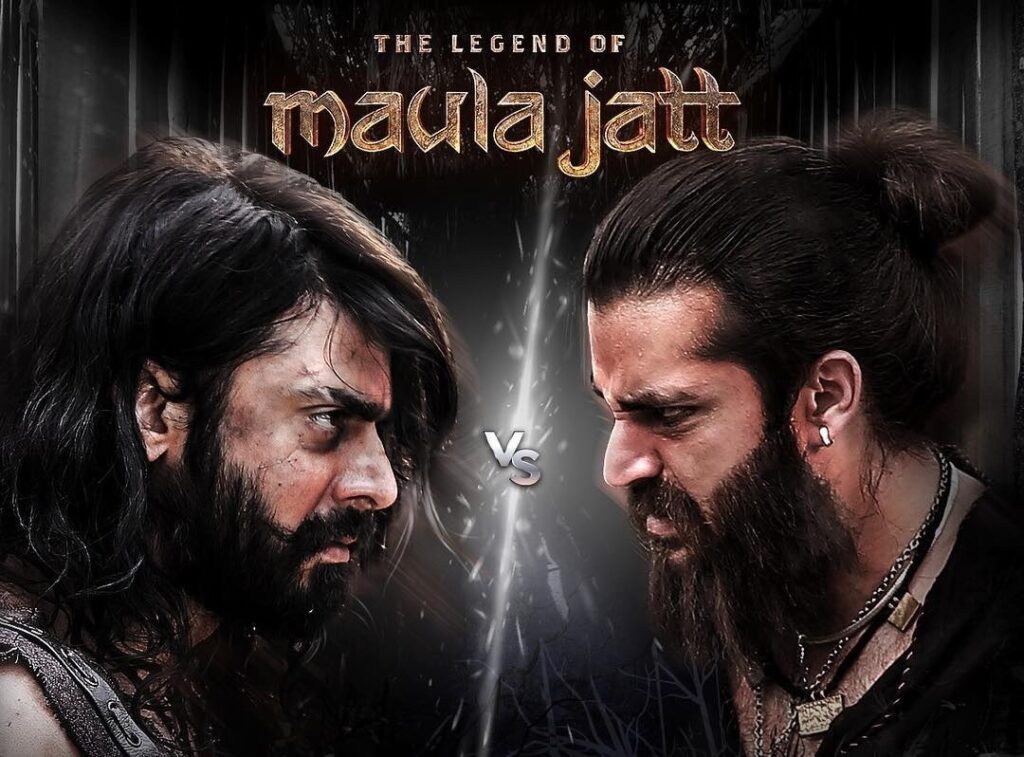Even before its completion, the making of The Legend Of Maula Jatt was already legendary as the film got bogged down in one delay after another. First, there was a drawn-out legal battle with the producer of the cult 1979 version, Sarwar Bhatti, concerning a breach of copyright, which took quite a while to settle. Then came Covid and the closing down of cinemas. The trailer arrived months before the film’s release and promised a shabby version of Baahubali meets Ertuğrul and Game of Thrones. There was worry that the delays may have dulled the public anticipation. Some joked about the film’s similarity to Jurassic Park’s ’65 million years’ in the making. However, when the film finally arrived on October 13th, 2022, 9 years after its initial announcement, The Legend Of Maula Jatt wowed Pakistani audiences like no other film before it. Though heavily influenced by machismo epics from Hollywood (and elsewhere), such as Gladiator and as mentioned, Game of Thrones and the famous Turkish series, Ertuğrul, the film delivered entertainment and spectacle in spades on a scale never seen before in Pakistani productions. Not only is it the most expensive Pakistani film till date, it is also by far the most successful Pakistani film of all time.
The Legend of Maula Jatt takes as its base the fundamental elements of the warring factions from the original Maula Jat (1979), starring Sultan Rahi and Mustafa Qureshi as the sworn enemies. However, it spins its tale cleverly, turning the narrative away from a socio-political film to one primarily designed to entertain and thrill as a popcorn action-epic entertainer with no other lofty aspirations. It also eschews any reference to religion as it shapes up as a film solely aimed at the mass market within Pakistan and with an eye on the box office market outside Pakistan.
The film concentrates on the enmity of the two clans and in particular on the conflict between the virtuous Maula Jatt (Fawad Khan) and the maniacal Noori Natt (Hamza Ali Abbasi). The opening scene sets the tone for what is to follow with Sardar Jatt (Babar Ali) and Malika Jatt (Resham) are assailed by a posse of ninjas with slightly Ku Klux Klan-like appearances, who brutally murder them, leaving their son as a survivor. The young boy, traumatised by flashbacks of the horrific murder of his parents, is whisked away to a benign foster mother so that he can escape the world of clan hatred and vengeance and grow up in a less oppressive environment. As he grows up, Maula Jatt finds considerable prowess as the town’s most fearless gladiator, defeating one and all at the weekly jousting competition. He also overcomes his silence in the company of his companion and love in the form of ardent devotee, Makhoo (Mahira Khan). Old wounds reopen as Maula defends the honour of a local woman threatened by the Natt clan resulting in the death of several of the Natts. Meanwhile, as the leader of the Natt clan searches for a successor, he is unsure which of his two sons will earn the right. The unhinged Maakho (Gohar Rasheed) seizes his opportunity to show his worth but it ends in disaster. The other incarcerated son, Noorie, is equally deranged but yearns for an adversary worthy of stature, which he finds in Maula. The stage is thus set for a mighty showdown between the righteous Maula Jatt and the psychotic Noorie…
The actors perform their roles with gusto. For all his character’s single-layered virtuousness, Fawad Khan nevertheless makes for a dashing title character. Mahira Khan is suitably fiesty even if her Punjabi lacks a little spark. Gohar Rasheed and Humaima Malik as Daaro Nattni, the sister of Maakho and Noori, are both outstanding, stealing every scene they appear in. Hamza Ali Abbassi, who has the impossible task of following in Mustafa Qureshi’s brilliance, manages to do his role justice, which is saying something. Noorie’s madness is not entirely evil; he is more than sympathetic to his sister. First, when he saves her from being buried alive and second, when he appoints her as the leader of the clan, thereby stunning the patriarchal dominion.
The film’s real stars, though, are writer Nasir Adeeb, who has rediscovered his mojo after an age and above all, writer-director Bilal Lashari. Lashari has created a visual epic unlike any that Pakistani cinema has experienced. The film barely ever flags in pace, and the script is lean and taut with minimal excess, thus keeping viewers engrossed. After the interval, there is a slight lull before the intensity picks up once again and doesn’t falter right to the end. There are some rousing moments, with the scene featuring Saima Baloch dancing for the Natt festivities being the most riveting of the entire film. The film is visually sumptuous, with stunning set design and locations. On a technical level, the film sets the bar at a standard not yet dreamed of in Pakistani cinema – the lighting, camerawork, and editing are all top-notch. The high octane action scenes are exhilarating with the fight choreography light years ahead from what viewers are accustomed to in local productions. Unsurprisingly, the excellent sound, visuals, and special effects, including CGI, were almost entirely in the hands of foreign artists. Many of these superb technical details had input by Indian artists, which, fortunately for the film, didn’t seem to cause any hindrance with Pakistan’s Censor Board. The film could have met hurdles had the censors been a stickler for the rule book, which forbids any Indian input whatsoever.
The Legend Of Maula Jatt is a triumph on many levels, setting new standards of production and technical excellence that will be difficult to surpass for the action-epic genre. It may not be the type of film that will win awards outside Pakistan, primarily due to the excessive machismo and gratuitous violence. Still, it certainly drags Pakistani cinema from a torpor into a new realm of technical excellence.
Punjabi, Drama, Action, Color


